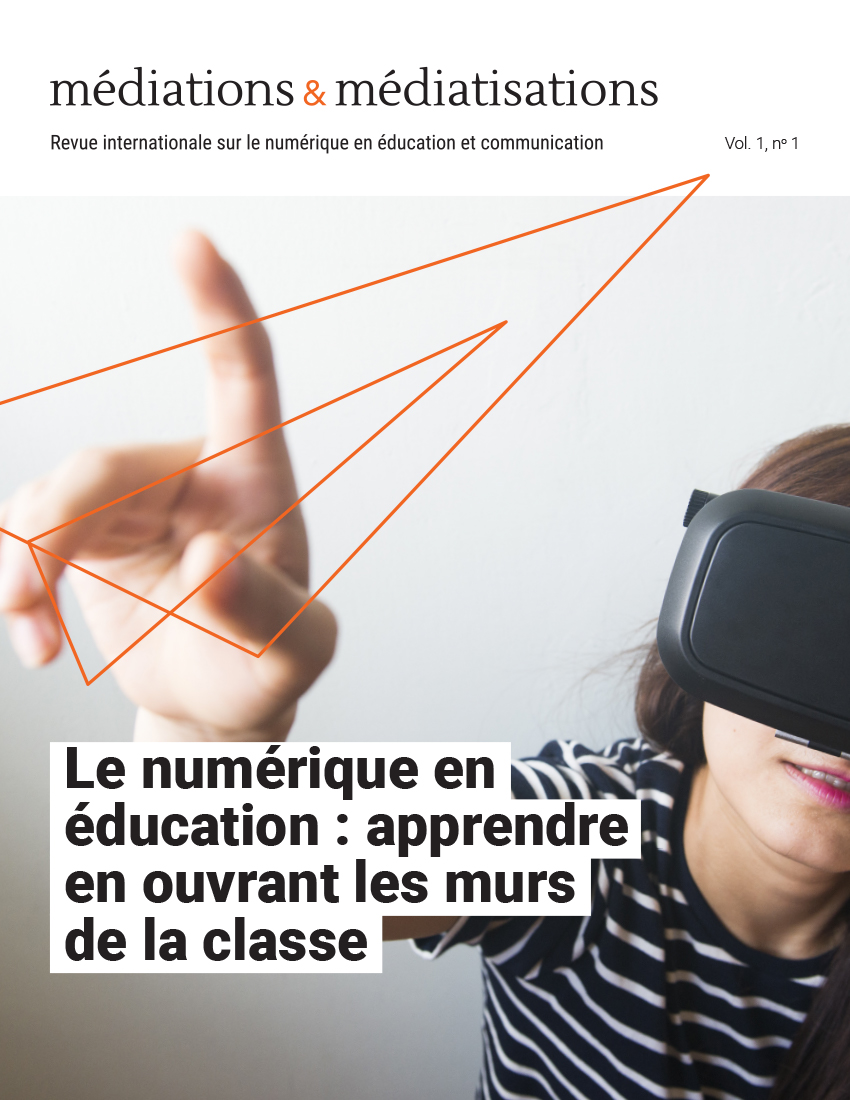Promouvoir la co-construction des connaissances des enseignants en formation ou en service à travers un projet interculturel télécollaboratif
Contenu principal de l'article
Résumé
Cet article présente les résultats d’un projet interculturel de télécollaboration entre quatre enseignants de langue seconde ou étrangère en formation ou en service. L’étude cherchait à analyser comment les savoirs étaient co-construits entre les membres de l’équipe via la négociation sociale en ligne. Les données, constituées de deux transcriptions de conversations ayant eu lieu sur la plateforme de conférence Skype, ont été analysées à l’aide d’une taxonomie adaptée du modèle de Gunawardena, Lowe et Anderson (1997). Les résultats ont montré que le plus grand nombre d’énoncés (62%) correspondaient à la Phase I (Partage/comparaison d’information) et que peu d’énoncés correspondaient à des phases avancées (Phases IV et V) de négociation de sens. Ces résultats soulèvent des interrogations quant à la conception de la tâche, à sa structure et à son contenu de sorte à favoriser des échanges de négociation de sens de niveaux supérieurs et à prévenir un potentiel manque d’implication.
Téléchargements
Renseignements sur l'article
Références
Antoniadou, V. (2011). Using activity theory to understand the contradictions in an online transatlantic collaboration between student-teachers of English as a foreign language. ReCALL, 23(3), 233-251. Doi: 10.1017/S0958344011000164
Arnold, N., & Ducate, L. (2006). Future foreign language teachers' social and cognitive collaboration in an online environment. Language Learning & Technology, 10(1), 42-66.
Dooly, M. (2011). Crossing the intercultural borders into 3rd space culture(s): implications for teacher education in the twenty-first century. Language and Intercultural Communication, 11(4), 319–337
Dooly, M., & Sadler, R. (2013). Filling in the gaps: Linking theory and practice through telecollaboration in teacher education. ReCALL 25(1), 4–29.
Garrison, D.R., Anderson, T., & Archer, W. (2001). Critical thinking, cognitive presence and computer conferencing in distance education. American Journal of Distance Education, 15(1), 7-23.
Guichon, N., & Hauck, M. (2011). Teacher education research in CALL and CMC: More in demand than ever. ReCALL, 23(3), 187-199.
Gunawardena, L., Lowe, C., & Anderson, T. (1997). Interaction analysis of a global online debate and the development of a constructivist interaction analysis model for computer conferencing. Journal of Educational Computing Research, 17(4), 395-429.
Hafner, C. A., Chik, A., & Jones, R. H. (2015). Digital literacies and language learning, Language Learning & Technology, 19(3), 1-7.
Hull, D. M., & Saxon, T. F. (2009). Negotiation of meaning and construction of knowledge: An experimental analysis of asynchronous online instruction. Computers & Education, 52, 624-639.
Ioannou, A., Demetriou, S., & Mama, M. (2014). Exploring factors influencing collaborative knowledge construction in online discussions: Student facilitation and quality of initial postings. American Journal of Distance Education, 28(3), 183-195.
Kanuka, H., & Anderson, T. (1998). Online social interchange, discord, and knowledge construction. International Journal of E-Learning & Distance Education/La Revue internationale de l’apprentissage en ligne et de l’enseignement à distance, 13(1) [Online]. Available: http://www.ijede.ca/index.php/jde/article/view/137/412
Keranen, N., & Bayyurt, Y. (2006). Intercultural telecollaboration: In-service EFL teachers in Mexico and pre-service EFL teachers in Turkey. TESL-EJ, 10(3) [Online]. Available: http://tesl-ej.org/ej39/a1.html
Koehler, M., & Mishra, P. (2009). What is technological pedagogical content knowledge? Contemporary Issues in Technology and Teacher Education, 9(1), 60-70.
Lewis, T. (2017). Introduction to System special issue on telecollaboration. System, 64, 1-6.
Liu, S. H. (2017). Text-based negotiated interaction of NNS-NNS and NNS-NS dyads on Facebook. ReCALL, 29(3), 294- 312.
Lucas, M. & Moreira, A. (2011). Using social web tools for knowledge construction. International Journal of Technology Enhanced Learning, 3(2), 151-161.
Marra, R.M., Moore, J.L. & Klimczak, A.K. (2004). Content analysis of online discussion forums: A comparative analysis of protocols. Educational Technology Research and Development, 52(2), 23–40.
Müller-Hartmann, A. (2006). Learning how to teach intercultural communicative competence via telecollaboration: A model for language teacher education. In J. Belz & S. Thorne (Eds.), Internet mediated intercultural foreign language education (pp. 63-84). Boston: Heinle & Heinle.
Müller-Hartmann, A. (2012). The classroom-based action research paradigm in telecollaboration. In M. Dooly & R. O’Dowd (Eds.), Research methods for online interaction and exchange (pp. 56-192). Bern, Switzerland: Peter Lang.
O'Dowd, R. (2015). The competences of the telecollaborative teacher. The Language Learning Journal, 43(2), 194-207, DOI: 10.1080/09571736.2013.853374
O’Dowd, R. (2017). Exploring the impact of telecollaboration in initial teacher education: The EVALUATE project. The EUROCALL Review, 25(2), 38-41.
Ogay, T., & Edelmann, D. (2011). Penser l’interculturalité dans la formation des professionnels: l’incontournable dialectique de la différence. In A. Lavanchy, F. Dervin & A. Gajardo (Eds.), Anthropologies de l’interculturalité (pp. 47-71). Paris: L’Harmattan.
Priego, S., & Liaw, M.-L. (2017). Listening to the multiple voices in an intercultural relecollaborative digital storytelling projet: A Bakhtinian perspective. ALSIC, 20 [Online]. URL: http://journals.openedition.org/alsic13168
Resnick, L. B., Levine, J. M., & Teasley, S. D. (1991). Perspectives on socially shared cognition. Washington: American Psychological Association.
Richards, K. (2003). Qualitative inquiry in TESOL. New York: Palgrave Macmillan.
Rouke, L., Andrerson, T., Garrison, D. R., & Archer, W. (2001). Assessing social presence in asynchronous text-computer conferencing. Journal of Distance Education / Revue de l’enseignement à distance [online].
Scardamalia, M., & Bereiter, C. (1994). Computer support for knowledge-building communities, The Journal of the Learning Sciences, 3, 265–283.
Stahl, G. (2006). Group cognition: Computer support for building collaborative knowledge. MIT Press, Cambridge, MA.
Von Glasersfeld, E. (1995). A constructivist approach to teaching, In L. Steffe & J. Gale (Eds.), Constructivism in education (pp.3–15). Lawrence Erlbaum, Hillsdale, NJ.
Vygotsky, L. (1978). Mind in society. Harvard University, Cambridge, Massachusetts, USA.
Wise, A.F., & Chiu, M.M. (2011). Analyzing temporal patterns of knowledge construction in a role-based online discussion. Computer-Supported Collaborative Learning, 6, 445-470.
Zeng, G. (2017). Collaborative dialogue in synchronous computer-mediated communication and face-to-face communication. ReCALL: The Journal of EUROCALL, 29(3), 257-275.

